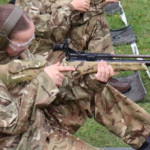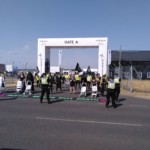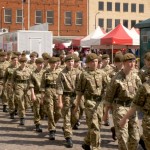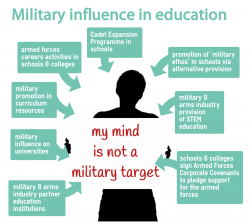 The UK armed forces visit thousands of schools each year. They offer career presentations, curriculum resources and other activities aimed at promoting the interests of the military and long-term recruitment. Since 2012, the Department for Education have promoted ‘military ethos’ programmes such as cadet units in state schools and ‘alternative provision with a military ethos’.
The UK armed forces visit thousands of schools each year. They offer career presentations, curriculum resources and other activities aimed at promoting the interests of the military and long-term recruitment. Since 2012, the Department for Education have promoted ‘military ethos’ programmes such as cadet units in state schools and ‘alternative provision with a military ethos’.
The armed forces and arms companies are increasingly involved in the provision of STEM (science, technology, engineering and maths) activities for school and college students. and they also sponsor a number of careers-led secondary schools. The armed forces also now sponsor youth organisations like Girlguiding and Scouts. See more here.
Should the armed forces by given access to children within education? How can we challenge their activities in schools and colleges? How can a more balanced view of the military be given to young people?
While there are claims that school involvement is not about recruiting young people, the Ministry of Defence has itself stated that visits to educational establishments are a ‘powerful tool for facilitating recruitment’.
In having contact with young people, the military aim to sow seeds in impressionable young minds. In 2007, the head of the Army’s recruitment strategy said, “Our new model is about raising awareness, and that takes a ten-year span. It starts with a seven-year-old boy seeing a parachutist at an air show and thinking, ‘That looks great.’ From then the army is trying to build interest by drip, drip, drip.”
The influence of military interests in education and youth activities raises concerns around:
- recruiting-related activities in school
- child welfare issues
- the unrepresentative portrayal of the armed forces
- weapons in schools and at public events aimed at interesting children and teenagers in a military career
- the need for balance in teaching controversial issues
- the lack of balance with other career providers coming into schools
- the lack of parental consultation and policy scrutiny
- concerns around targeting disadvantaged areas and prioritising over other youth activities
- lack of balance with education for peace
- marginalising individuals and groups to do not wish to participate in military-related activities
See our briefing on Military involvement in education and youth activities in the UK.
We recognise the importance of debate and critical thinking in helping young people make an informed choice about the military and its activities. This is particularly important for those thinking of a career in the forces, a uniquely risk-laden occupation. If the military are allowed to have a presence and influence in the UK education system then it should be balanced by a thorough exploration of opposing views and approaches, as demanded by the 1996 Education Act.
Useful resources
White Poppies for Schools
 We have teamed up with the Peace Pledge Union to produce a White Poppy Schools Pack, which aims to explore Remembrance in a way that encourages critical thinking, and gives space for marginalised perspectives on war and peace.
The learning resource can be read online here, or purchased from the Peace Pledge Union as a bigger pack including white poppies and white poppy leaflets.
We have teamed up with the Peace Pledge Union to produce a White Poppy Schools Pack, which aims to explore Remembrance in a way that encourages critical thinking, and gives space for marginalised perspectives on war and peace.
The learning resource can be read online here, or purchased from the Peace Pledge Union as a bigger pack including white poppies and white poppy leaflets.
Training school pupils for the military and surveillance?
 With recent announcements about cadets in schools and Cyber Cadets, we critique government commissioned research and political thinking that could lead to a far wider introduction of cadets and the harnessing of young people into 'tackling security threats'.
With recent announcements about cadets in schools and Cyber Cadets, we critique government commissioned research and political thinking that could lead to a far wider introduction of cadets and the harnessing of young people into 'tackling security threats'.
Everyday Militarism poster

Military involvement in education and youth activities in the UK
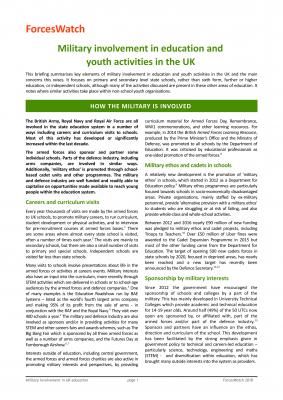 This briefing summarises key elements of military involvement in education and youth activities in the UK. It covers the defence industry as well as the armed forces and Ministry of Defence. It outlines the main concerns this raises and how these concerns have been voiced so far.
This briefing summarises key elements of military involvement in education and youth activities in the UK. It covers the defence industry as well as the armed forces and Ministry of Defence. It outlines the main concerns this raises and how these concerns have been voiced so far.
Misguided aim of weapons show
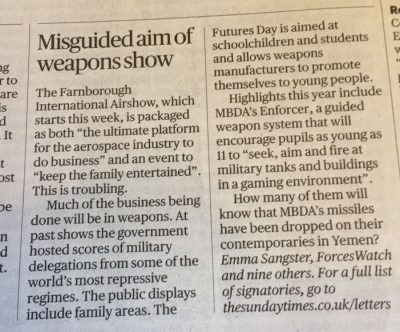 The following letter was sent to the Sunday Times and a version is published here.
The following letter was sent to the Sunday Times and a version is published here.
The armed forces and special schools
Ministry of Defence misleading public over armed forces visits to schools
Ethics not (military) ethos
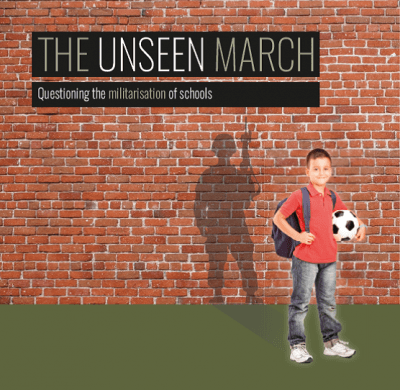 Former education minister Robert Goodwill has been tasked with drawing up a report for the Ministry of Defence (MoD) on the benefits of ‘military ethos’ in schools. Defence Secretary Gavin Williamson has suggested this could include ‘military academies’ in disadvantaged areas.
We consider the ethics of imposing an ethos from outside of education, especially when it serves interests at odds with the best interests of young people.
Former education minister Robert Goodwill has been tasked with drawing up a report for the Ministry of Defence (MoD) on the benefits of ‘military ethos’ in schools. Defence Secretary Gavin Williamson has suggested this could include ‘military academies’ in disadvantaged areas.
We consider the ethics of imposing an ethos from outside of education, especially when it serves interests at odds with the best interests of young people.
Submission to the Human Rights and the Scottish Parliament inquiry
 This submission made by ForcesWatch and Quakers in Scotland to the Scottish Parliament's human rights inquiry details our concerns around the need for regulation and transparent accountability of military activities in schools, the lack of education about peace and human rights, and the continued recruitment of children into the UK armed forces.
This submission made by ForcesWatch and Quakers in Scotland to the Scottish Parliament's human rights inquiry details our concerns around the need for regulation and transparent accountability of military activities in schools, the lack of education about peace and human rights, and the continued recruitment of children into the UK armed forces.

